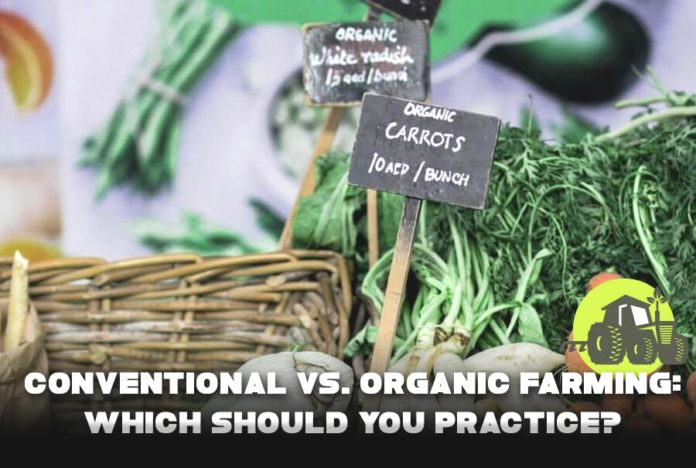The conventional vs. organic farming debate has always been a hot issue. The truth is, there really needn’t be a debate at all. Both methods, in the end, come with their own pros and cons. Likewise, each farmer is free to choose what methods they want to adopt on the farm.
If you’re just starting and undecided on which path to take, this guide is for you. Remember: there isn’t a right way or a wrong way. It really boils down to your priorities, personal preference, and objectives. In fact, many farmers incorporate both organic and inorganic methods into their farms.
WHAT IS ORGANIC FARMING?
The USDA Study Team on Organic Farming defines the term as, “a production system which avoids or largely excludes the use of synthetically compounded fertilizers, pesticides, growth regulators, and livestock feed additives.”
Instead, it largely relies on materials and techniques like crop rotation, biological pest control, animal manure, crop residues, and mechanical cultivation to promote soil productivity and control insects.
Basically, instead of trying to dominate or control nature with the use of artificial means, organic farmers try to co-operate with their environments using natural methods and products. For example, instead of using chemical pesticides to minimize losses due to insects, organic farmers will try to develop biological diversity in the field to make it unlivable for pest organisms.
The U.S. Department of Agriculture requires big-time organic farmers (those who sell more than $5,000 a year in organic produce) to comply with its organic certification program. This program ensures that all organic foods meet strict government standards. Only after complying will they be allowed to sell food labeled as organic.
WHAT IS CONVENTIONAL FARMING?
Conventional farming uses artificial farming methods to ward off pests, manage weed, and promote soil productivity. Note that though these methods may involve chemicals and/or synthetic substances, products grown through conventional means are still 100% safe for consumption.
However, the use of pesticides and chemical fertilizers has always been the biggest issue hurled against conventional farming. Critics claim that although these substances are deemed safe for consumption, they can trigger health problems in the long run. Moreover, staunch supporters of organic farming also claim that conventional farming causes irreversible damage to the environment.
On the other hand, conventional farming has several advantages over organic farming. For one, it’s normally cheaper and easier to execute. Also, since conventional methods generally produce higher yield, farmers tend to end up with more sales and higher profits. In the end, conventional farming does a better job of maximizing resources and soil productivity.
Conventional crops also minimize wastes and spoilage because they’re more robust and resistant to insects, especially the genetically-modified varieties.
CONVENTIONAL VS. ORGANIC FARMING: IN SUMMARY
All farmers, whether they employ organic or conventional methods, care about the same things: growing safe food and taking care of the land for years to come. The organic-inorganic debate isn’t and shouldn’t be a black or white issue. You’re free to incorporate techniques from both methods as you see fit.
In summary, here are the key differences between organic and conventional farming methods:
SOIL
• Conventional farming uses artificial fertilizers like urea and anhydrous ammonia to add nutrients to the soil
• Organic farming uses organic fertilizers like compost, clay, and calcium carbonate
ANIMALS
• Conventional farmers are free to use conventional feeds and approved antibiotics
• Organic farming sticks to organic feed
SEEDS
• Conventional farming may or may not use genetically-modified seeds to increase yield, improve quality of products, and/or ward off pests
• Organic farming relies on non-GMO seeds, which are often saved from organically-grown crops
PESTS
• Conventional farming uses chemical insecticides to combat pests
• Organic farming uses physical and biological control agents, such as traps, barriers, mineral balance, and companion planting to fight pests
COST
As previously mentioned, conventional farming methods generally lead to higher productivity and yield. With that said, costs associated with organic farming tend to be higher. This explains why organic products are more expensive and less accessible than conventional produce.
What are your thoughts about conventional vs. organic farming? We’d love to hear your comments and ideas below!
behindtheplow.com








